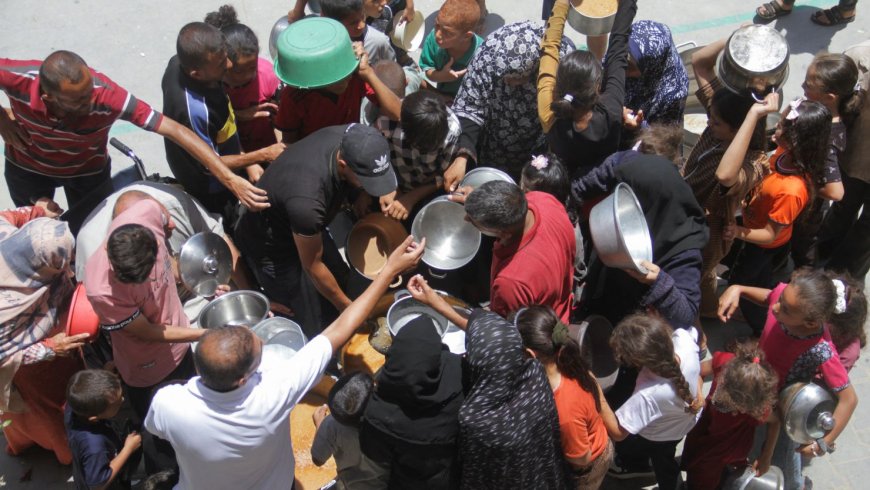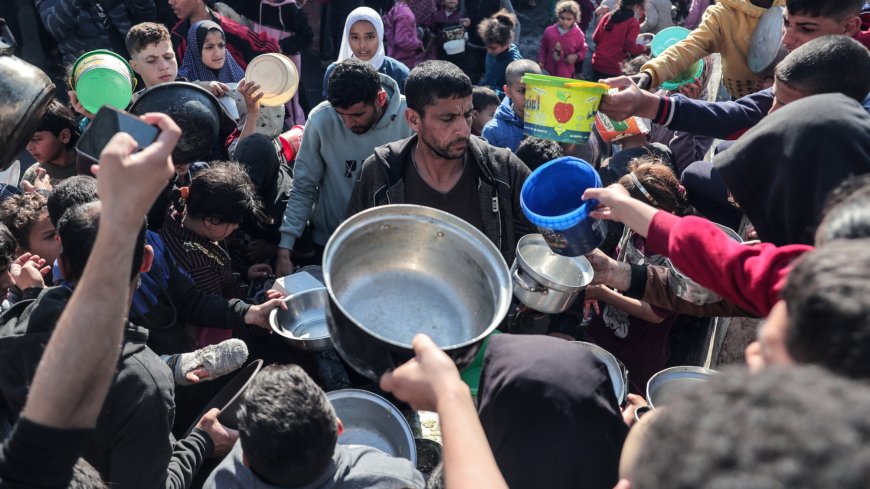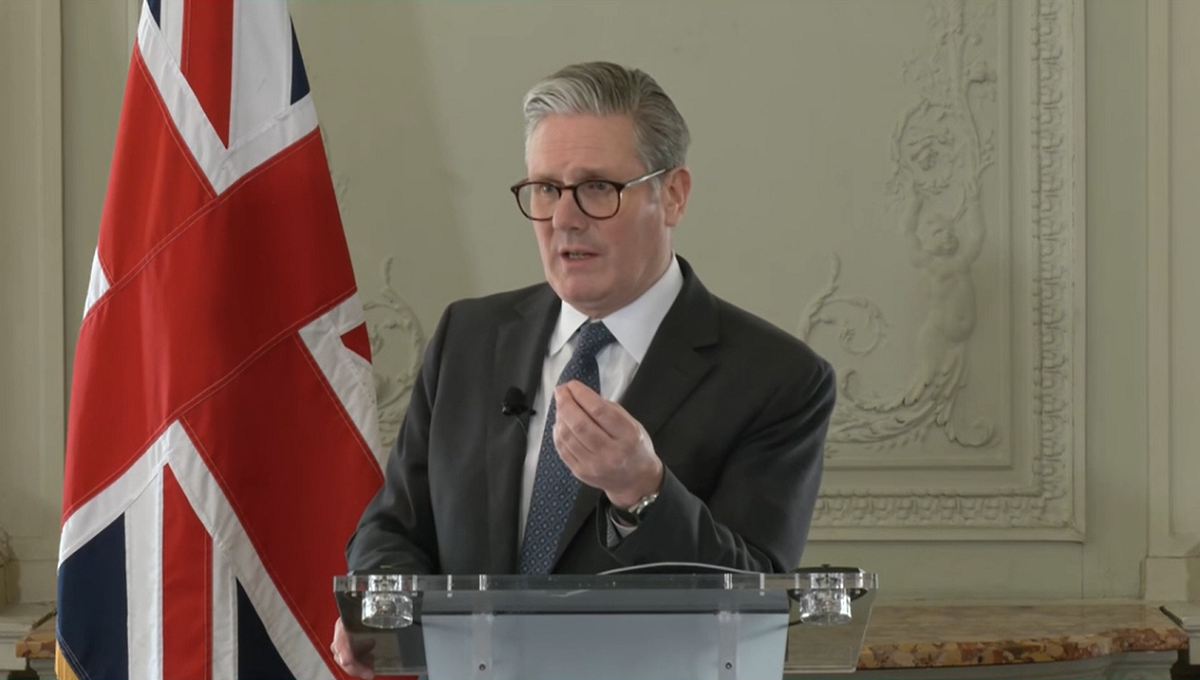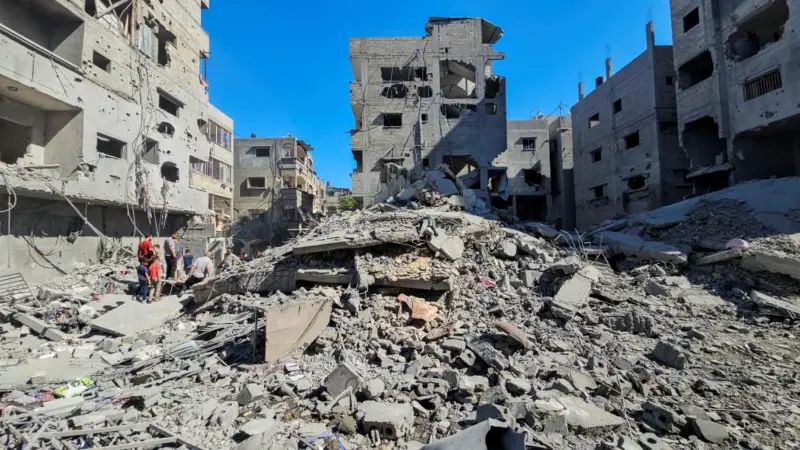Famine has spread throughout Gaza, say UN experts By Eyad Kourdi
The recent deaths of more Palestinian children due to hunger and malnutrition in the Gaza Strip indicates that famine has spread across the entire enclave, according to a United Nations statement, citing independent experts.
An estimated 495,000 people in Gaza – or 22% of the population – are “experiencing an extreme lack of food,” according to an Integrated Food Security Phase Classification (IPC) report last month.
Under the IPC system – a five-phase scale used as a common standard for classifying the severity of food insecurity – a famine can only be declared if data shows certain thresholds are met.
In the UN statement, published Tuesday, the group of experts said: “Israel’s intentional and targeted starvation campaign against the Palestinian people is a form of genocidal violence and has resulted in famine across all of Gaza.
“We call upon the international community to prioritise the delivery of humanitarian aid by land by any means necessary, end Israel’s siege, and establish a ceasefire,” they continued.
The experts said that deaths of children from a lack of food and water indicate that health and social structures have been critically weakened. “When the first child dies from malnutrition and dehydration, it becomes irrefutable that famine has taken hold,” the experts added.
The statement cited the deaths of three Palestinian children — 6-month-old Fayez Ataya, 13-year-old Abdulqader Al-Serhi and 9-year-old Ahmad Abu Reida. It said they died from malnutrition and lack of access to adequate healthcare in late May and early June.
The experts emphasized that these children had died from starvation despite medical treatment in central Gaza, indicating that famine has now spread from northern Gaza into central and southern regions.
CNN has reached out to the Israel Defense Forces (IDF) and Israeli Prime Minister’s Office (PMO) for comment.
Israel’s permanent mission to the UN in Geneva dismissed the statement, alleging the experts were “spreading misinformation” and “supporting Hamas propaganda.”
In June, the IPC reported a deterioration in the humanitarian situation following the launch of Israel’s military operations in Rafah. The Rafah crossing – a crucial route for humanitarian aid to Gaza – has been closed since early May.
Meanwhile, a much-lauded but ultimately troubled US military pier set up off the Gazan coast will be permanently removed soon, according to US officials. The $230 temporary pier operation – intended as an alternative aid distribution option to land routes – based at the Israeli port of Ashdod has faced many challenges since it began operation in mid-May.
Last month it was disconnected from Gaza due to inclement weather, but will be reconnected one final time to deliver any remaining aid from Cyprus and from a floating dock that is moored several miles off shore. More than 19.4 million pounds of aid have been delivered via the pier to the collection area in Gaza since it started operations.
Humanitarian aid workers continue to face tremendous risks while trying to distribute desperately needed aid to Gaza, the UN said. The majority of the infrastructure supporting humanitarian work in Gaza has been destroyed in Israel’s conflict with Hamas, according to the same report.
ActionAid, an international campaign group, described the UN experts’ statement as a “stark warning.”
Amjad Al-Qanou, pictured in Gaza City, in northern Gaza, on June 9. The 3-year-old toddler is suffering from malnutrition, as human rights agencies warn of a deepening hunger crisis amid Israel's siege.
“This is a stain on humanity’s conscience and an entirely preventable, human-made crisis. The world cannot sit back and watch any more children die from lack of food: more life-saving aid must be allowed into Gaza immediately,” the group said in a Wednesday statement. “We call on all states to use every diplomatic lever available to them to bring about a permanent ceasefire, now.”
Israel’s war in Gaza has depleted the territory’s health system, leaving staff unable to treat malnourished children. Doctors previously told CNN they are being forced to turn away parents begging for baby milk, unable to even triage young patients with chronic illnesses compounded by severe hunger.
And as Israel continues its siege on Gaza, preventing aid groups getting enough food into the enclave, parents say they have no choice but to watch their children starve to death.
At least 34 children have already died of malnutrition in Gaza, the government media office reported on June 22. The true number could be higher, as limited access to the strip has impeded aid agencies’ efforts to fully assess the crisis there.
- CNN’s Michael Schwartz, Duarte Mendonca, Alex Stambaugh, Oren Liebermann and Natasha Bertrand contributed reporting.
Source : CNN


























































